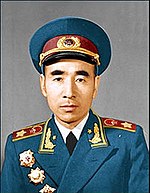Lin Biao, Date of Birth, Place of Birth, Date of Death
TweetLin Biao
Vice Chairman of the Communist Party of ChinaAbout Lin Biao
- Lin Biao (December 5, 1907 – September 13, 1971) was a Marshal of the People's Republic of China who was pivotal in the Communist victory in the Chinese Civil War, especially in Northeast China.
- Lin was the general who commanded the decisive Liaoshen and Pingjin Campaigns, in which he co-led the Manchurian Field Army to victory and led the People's Liberation Army into Beijing.
- He crossed the Yangtze River in 1949, decisively defeated the Kuomintang and took control of the coastal provinces in Southeast China.
- He ranked third among the Ten Marshals.
- Zhu De and Peng Dehuai were considered senior to Lin, and Lin ranked directly ahead of He Long and Liu Bocheng. Lin abstained from taking an active role in politics after the civil war ceased in 1949.
- He led a section of the government's civil bureaucracy as one of the co-serving Vice Premiers of the People's Republic of China from 1954 onwards, becoming First Vice Premier from 1964.
- Lin became more active in politics when named one of the co-serving Vice Chairmen of the Communist Party of China in 1958.
- He held the three responsibilities of Vice Premier, Vice Chairman and Minister of National Defense from 1959 onwards.
- Lin became instrumental in creating the foundations for Mao Zedong's cult of personality in the early 1960s, and was rewarded for his service in the Cultural Revolution by being named Mao's designated successor as the sole Vice Chairman of the Communist Party of China, from 1966 until his death. Lin died on September 13, 1971, when a Hawker Siddeley Trident he was aboard crashed in Öndörkhaan in Mongolia.
- The exact events of this "Lin Biao incident" have been a source of speculation ever since.
- The Chinese government's official explanation is that Lin and his family attempted to flee following a botched coup against Mao.
- Others have argued that they fled out of fear they would be purged, as Lin's relationship with other Communist Party leaders had soured in the final few years of his life.
- Following Lin's death, he was officially condemned as a traitor by the Communist Party.
- Since the late 1970s Lin, and Mao's wife Jiang Qing (with her Gang of Four) have been labeled the two major "counter-revolutionary forces" of the Cultural Revolution, receiving official blame from the Chinese government.
Read more at Wikipedia
See Also
- Famous People's Birthdays on 05 December, China
- Famous People's Birthdays in December, China
- Famous military personnel's Birthdays on 05 December, China
- Famous military personnel's Birthdays in December, China
- Famous politician's Birthdays on 05 December, China
- Famous politician's Birthdays in December, China


 Date of Birth:
Date of Birth:  Place of Birth: Changsha, Hunan, China
Place of Birth: Changsha, Hunan, China